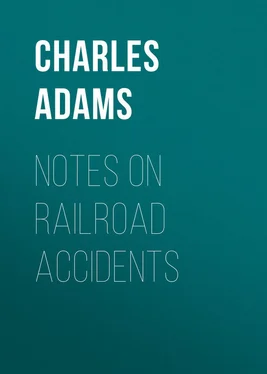Charles Adams - Notes on Railroad Accidents
Здесь есть возможность читать онлайн «Charles Adams - Notes on Railroad Accidents» — ознакомительный отрывок электронной книги совершенно бесплатно, а после прочтения отрывка купить полную версию. В некоторых случаях можно слушать аудио, скачать через торрент в формате fb2 и присутствует краткое содержание. Жанр: foreign_antique, foreign_prose, на английском языке. Описание произведения, (предисловие) а так же отзывы посетителей доступны на портале библиотеки ЛибКат.
- Название:Notes on Railroad Accidents
- Автор:
- Жанр:
- Год:неизвестен
- ISBN:нет данных
- Рейтинг книги:4 / 5. Голосов: 1
-
Избранное:Добавить в избранное
- Отзывы:
-
Ваша оценка:
- 80
- 1
- 2
- 3
- 4
- 5
Notes on Railroad Accidents: краткое содержание, описание и аннотация
Предлагаем к чтению аннотацию, описание, краткое содержание или предисловие (зависит от того, что написал сам автор книги «Notes on Railroad Accidents»). Если вы не нашли необходимую информацию о книге — напишите в комментариях, мы постараемся отыскать её.
Notes on Railroad Accidents — читать онлайн ознакомительный отрывок
Ниже представлен текст книги, разбитый по страницам. Система сохранения места последней прочитанной страницы, позволяет с удобством читать онлайн бесплатно книгу «Notes on Railroad Accidents», без необходимости каждый раз заново искать на чём Вы остановились. Поставьте закладку, и сможете в любой момент перейти на страницу, на которой закончили чтение.
Интервал:
Закладка:
It is not easy now to conceive the excitement and dismay which this catastrophe caused throughout France. The railroad was at once associated in the minds of an excitable people with novel forms of imminent death. France had at best been laggard enough in its adoption of the new invention, and now it seemed for a time as if the Versailles disaster was to operate as a barrier in the way of all further railroad development. Persons availed themselves of the steam roads already constructed as rarely as possible, and then in fear and trembling, while steps were taken to substitute horse for steam power on other roads then in process of construction.
The disaster was, indeed, one well calculated to make a deep impression on the popular mind, for it lacked almost no attribute of the dramatic and terrible. There were circumstances connected with it, too, which gave it a sort of moral significance, – contrasting so suddenly the joyous return from the country fête in the pleasant afternoon of May, with what De Quincey has called the vision of sudden death. It contained a whole homily on the familiar text. As respects the number of those killed and injured, also, the Versailles accident has not often been surpassed; perhaps never in France. In this country it was surpassed on one occasion, among others, under circumstances very similar to it. This was the accident at Camphill station, about twelve miles from Philadelphia, on July 17, 1856, which befell an excursion train carrying some eleven hundred children, who had gone out on a Sunday-school picnic in charge of their teachers and friends.
It was the usual story. The road had but a single track, and the train, both long and heavy, had been delayed and was running behind its schedule time. The conductor thought, however, that the next station could yet be reached in time to meet and there pass a regular train coming towards him. It may have been a miscalculation of seconds, it may have been a difference of watches, or perhaps the regular train was slightly before its time; but, however it happened, as the excursion train, while running at speed, was rounding a reverse curve, it came full upon the regular train, which had just left the station. In those days, as compared with the present, the cars were but egg-shells, and the shock was terrific. The locomotives struck each other, and, after rearing themselves up for an instant, it is said, like living animals, fell to the ground mere masses of rubbish. In any case the force of the shock was sufficient to hurl both engines from the track and lay them side by side at right angles to, and some distance from it. As only the excursion train happened to be running at speed, it alone had all the impetus necessary for telescoping; three of its cars accordingly closed in upon each other, and the children in them were crushed; as in the Versailles accident, two succeeding cars were driven upon this mass, and then fire was set to the whole from the ruins of the locomotives. It would be hard to imagine anything more thoroughly heart-rending, for the holocaust was of little children on a party of pleasure. Five cars in all were burned, and sixty-six persons perished; the injured numbered more than a hundred. 5 5 A collision very similar to that at Camphill occurred upon the Erie railway at a point about 20 miles west of Port Jervis on the afternoon of July 15, 1864. The train in this case consisted of eighteen cars, in which were some 85 °Confederate soldiers on their way under guard to the prisoner's camp at Elmira. A coal train consisting of 50 loaded cars from the hanch took the main line at Lackawaxen. The telegraph operator there informed its conductor that the track was clear, and, while rounding a sharp reversed curve, the two trains came together, the one going at about twelve and the other at some twenty miles an hour. Some 60 of the soldiers, besides a number of train hands were killed on the spot, and 120 more were seriously injured, some of them fatally. This disaster occurred in the midst of some of the most important operations of the Rebellion and excited at the time hardly any notice. There was a suggestive military promptness in the subsequent proceedings. "T. J. Ridgeway, Esq., Associate Judge of Pike County, was soon on the spot, and, after consultation with Mr. Riddle [the superintendent of the Erie road] and the officer in command of the men, a jury was impanneled and an inquest held; after which a large trench was dug by the soldiers and the railway employés, 76 feet long, 8 feet wide and 6 feet deep, in which the bodies were at once interred in boxes, hastily constructed – one being allotted to four rebels, and one to each Union soldier." There were sixteen of the latter killed.
Of this disaster nothing could be said either in excuse or in extenuation; it was not only one of the worst description, but it was one of that description the occurrence of which is most frequent. An excursion train, while running against time on a single-track road, came in collision with a regular train. The record is full of similar disasters, too numerous to admit of specific reference. Primarily of course, the conductors of the special trains are as a rule in fault in such cases. He certainly was at Camphill, and felt himself to be so, for the next day he committed suicide by swallowing arsenic. But in reality in these and in all similar cases, – both those which have happened and those hereafter surely destined to happen, – the full responsibility does not rest upon the unfortunate or careless subordinate; – nor should the weight of punishment be visited upon him. It belongs elsewhere. At this late day no board of directors, nor president, nor superintendent has any right to operate a single track road without the systematic use of the telegraph in connection with its train movements. That the telegraph can be used to block, as it is termed, double-track roads, by dividing them into sections upon no one of which two trains can be running at the same time, is matter of long and daily experience. There is nothing new or experimental about it. It is a system which has been forced on the more crowded lines of the world as an alternative to perennial killings. That in the year 1879 excursion trains should rush along single-track roads and hurl themselves against regular trains, just as was done twenty-three years ago at Camphill, would be deemed incredible were not exactly similar accidents still from time to time reported. One occurred near St. Louis, for instance, on July 4, 1879. The simple fact is that to now operate single-track roads without the constant aid of the telegraph, as a means of blocking them for every irregular train, indicates a degree of wanton carelessness, or an excess of incompetence, for which adequate provision should be made in the criminal law. Nothing but this appeal to the whipping-post, as it were, seems to produce the needed mental activity; for it is difficult to realize the stupid conservatism of ordinary men when brought to the consideration of something to which they are not accustomed. On this very point of controlling the train movement of single-track roads by telegraph, for instance, within a very recent period the superintendent of a leading Massachusetts road gravely assured the railroad commissioners of that state, that he considered it a most dangerous reliance which had occasioned many disasters, and that he had no doubt it would be speedily abandoned as a practice in favor of the old time-table and running-rules system, from which no deviations would be allowed. This opinion was expressed, also, after the Revere disaster of 1871, it might have been supposed, had branded into the record of the state the impossibility of safely running any crowded railroad in a reliance upon the schedule. 6 6 Chapter XIV, XVI.
Such men as this, however, are not accessible to argument or the teachings of experience, and the gentle stimulant of a criminal prosecution seems to be the only thing left.
Интервал:
Закладка:
Похожие книги на «Notes on Railroad Accidents»
Представляем Вашему вниманию похожие книги на «Notes on Railroad Accidents» списком для выбора. Мы отобрали схожую по названию и смыслу литературу в надежде предоставить читателям больше вариантов отыскать новые, интересные, ещё непрочитанные произведения.
Обсуждение, отзывы о книге «Notes on Railroad Accidents» и просто собственные мнения читателей. Оставьте ваши комментарии, напишите, что Вы думаете о произведении, его смысле или главных героях. Укажите что конкретно понравилось, а что нет, и почему Вы так считаете.












